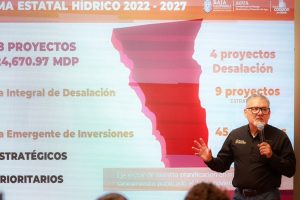 -Editorial
-Editorial
Baja California Governor Marina del Pilar Ávila Olmeda announced Wednesday the start of construction of the Rosarito Desalination Plant, a project aimed at resolving long-standing water shortages in the region. The initiative is part of the National Water Plan 2024–2030 and has the backing of President Claudia Sheinbaum.
The plant will require an initial investment of 15 billion pesos and will have the capacity to produce 2,200 liters of water per second. According to state officials, the project is expected to provide a reliable water supply to residents of Tijuana, Playas de Rosarito, and parts of Ensenada, where many households have experienced years of water rationing.
The National Water Commission (CONAGUA) will oversee construction, while the state government will handle operations and maintenance once the facility is completed.
Governor Ávila noted that investments in water infrastructure have already helped stabilize supply during summer months. “Water and sanitation works may not always be visible because they are underground, but they are what truly transform people’s quality of life,” she said during her morning press conference.
The project is also part of the State Water Program 2022–2027, which includes 58 initiatives in desalination, wastewater treatment, sewerage, and water reuse, representing a total investment of more than 24.6 billion pesos.
Other key infrastructure projects include the near-complete rehabilitation of the Río Colorado–Tijuana aqueduct (98 percent finished), the modernization of La Nopalera plant in Tecate (74 percent), the Abelardo L. Rodríguez purification plant in Tijuana (85 percent), and upgrades to potable water networks in Tijuana and Ensenada (94.5 percent).
Víctor Amador Barragán, head of the Secretariat for Water Management, Sanitation, and Protection, highlighted the work of state water commission employees, crediting them with positioning Baja California among the states with the highest water coverage. Current service levels stand at 99.8 percent in Tijuana and Rosarito, 98.4 percent in Mexicali, 95.6 percent in Tecate, and 89.2 percent in Ensenada.
Additionally, federal officials announced that starting in 2025, the Municipal Social Infrastructure Fund (FAISMUN) will be expanded to include water and sanitation projects, with the goal of extending infrastructure to underserved communities and promoting more equitable access to water.


